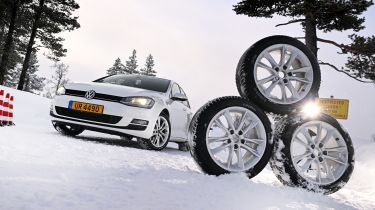Best winter tyres 2026
Our testers warmed to the task of finding the best cold-weather rubber for your car
This year’s winter tyre test returns to the big-selling 225/45 R17 size. Snow may be rare for some of us, but winter tyres guarantee that you have the best solution for the worst weather, and they are so much better than summer tyres in the coldest months, even without the white stuff.
In our last two tests of this size, the Continental WinterContact TS 870 has emerged victorious, and it returns hoping to secure what would be a remarkable hat-trick. The opposition has been busy, though. Bridgestone finished a close second last time and brings its new Blizzak 6, while third-placed Goodyear competes again with its UltraGrip Performance 3 and Vredestein brings its Wintrac Pro+.
Michelin joins the contest with its new Alpin 7, Falken brings its updated Eurowinter HS02PRO, and LingLong competes for the first time with its Sport Master Winter. Absentees include Hankook, which is replacing its i’cept RS3 (fourth last time), and Pirelli, which is working on a tyre to take over from the Cinturato Winter2.
Our eighth product in this test is a randomly chosen budget winter tyre that we include to show the level of performance you can expect compared with premium brands. This year it’s the Triangle WinterX TW401.
What we tested
As is now our policy, we sourced all our tyres from the open market via an independent wholesale supplier in Germany.
Used - available now

2022 Audi
A4
66,973 milesManualPetrol2.0L
Cash £16,000
2023 Mercedes
A-Class
44,295 milesAutomaticPetrol1.3L
Cash £14,900
2023 Tesla
Model 3 Premium
53,700 milesAutomaticElectric
Cash £16,500
2022 BMW
X1
44,186 milesAutomaticPetrol1.5L
Cash £18,700The invited tyre manufacturers nominated their tyres without restriction and most opted for a speed rating of V (149mph) and a weight rating of 94, apart from two which opted for 91H (130mph) and one for 94W (168mph).
EU tyre label ratings are included for fuel economy (RR – rolling resistance) and wet grip (WG), which range from A to E, with A being best, plus pass-by noise (N), which is measured in decibels, so the lower the number the better.
| Bridgestone Blizzak 6 | 94V RR:C WG:B N:B (70) | £150 |
| Continental WinterContact TS 870 | 91H RR:C WG:B N:B (70) | £154 |
| Falken Eurowinter HS02PRO | 94V RR:D WG:B N:A (70) | £130 |
| Goodyear UltraGrip Performance 3 | 91H RR:D WG:B N:B (71) | £145 |
| LingLong Sport Master Winter | 94W RR:D WG:A N:B (72) | £90 |
| Michelin Alpin 7 | 94V RR:C WG:B N:B (71) | £170 |
| Triangle WinterX TW401 | 94V RR:D WG:C N:A (72) | £77 |
| Vredestein Wintrac Pro+ | 94H RR:C WG:C N:B (71) | £122 |
How we tested them
Three main elements make up our test: snow, wet and dry performance
Snow
For the snow elements, we went to Goodyear’s ‘Arctic Center’ facility in Saariselkä, northern Finland. Conditions were just cold enough for consistency for our snow laps, with track temperatures ranging from minus seven to minus four degrees Celsius.
The handling evaluation was on a short but demanding 0.8km (0.5-mile) track, with one significant drop and rise, a couple of quick transitions that test handling balance and lateral grip, and a number of tight corners to check braking and traction. We tested braking from 50-5kph (30-3mph) and acceleration from 8-30kph (5-20mph), averaging a number of runs from two days.
Wet tests
As usual, wet and dry tests were done at Continental’s Contidrom near Hannover in Germany, the most northerly and therefore coldest, regular tyre-test facility in Europe. We started early in the day when temperatures were good, in the region of 4deg C; the compound of winter tyres is designed to work best below 7deg C.
Our wet tests measured each tyre’s braking and cornering ability, plus their resistance to aquaplaning in deeper water. The crucial straight-line braking test from 50mph to zero was conducted on a rail, ensuring that the same piece of asphalt was used each time. Wet cornering was derived from lap times on a 57.5-metre-diameter circle, and the 1.1-mile wet handling circuit’s demanding combination of corners revealed each tyre’s handling balance and breakaway characteristics, cornering grip, traction, and composure under braking.
In straight-line aquaplaning we measured the speed at which each tyre running in 9mm of water was slipping by 15 per cent compared with the other tyre on a dry surface. In curved aquaplaning, each tyre is run through a curve flooded to 5mm at speeds from 37-56mph and the average residual lateral acceleration was calculated.
Dry
Dry braking distances were measured from 62mph (100kmh) down to zero. We measured lap times on a one-mile part of the dry-handling circuit, with a mix of fast and slow turns that let us assess handling balance, lateral grip, transient stability, braking and traction.
Noise
The EU tyre label describes drive-by noise – how loud a tyre is from the outside – but we measured sound in the cabin, the thing occupants would hear. We evaluate coastdown noise from 80kph (50mph) on three surfaces, from smooth to coarse, and took the average result.
Fuel economy
Rolling resistance – the energy required to turn a loaded tyre – was measured to industry standards. The less energy required, the more economical a tyre will be. A four to five per cent change in rolling resistance is equivalent to a one per cent change in fuel consumption.
Prices
The results for each test category are converted into percentages, with the top tyre rated at 100 per cent and the others scored relative to this. In terms of the overall score, 50 per cent is allocated to wet performance, 20 per cent to snow and 20 per cent to dry, with the emphasis on handling and braking. The final 10 per cent is shared between the other tests.
Calculating a winner
The results for each test category are converted into percentages with the top tyre rated at 100 per cent and the rest scored relative to this. In terms of the overall score, 50 per cent is allocated to wet performance, 20 per cent to snow and 20 per cent to dry, with the emphasis on handling and braking. The final 10 per cent is shared between the other tests.






